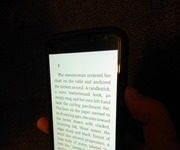One of the concerns, or complaints, you hear often enough about ebooks is the by now fairly familiar one that they are some kind of Trojan horse for non-print media and its perennial ability to sap our attention spans. Argentine Spanish writer Hernán Casciari took this criticism right into the lion’s mouth last week at the third International E-book Symposium in Mexico City last week, as reported by Publishing Perspectives. There, he declared that: “I don’t care if people read ebooks or traditional books, or about the relationship between both, or about the death of either. What’s important right now is our lack of concentration, our inability to be able to read, listen or write for more than 20 minutes.”

Admittedly, it’s not the ebook format itself he blames for this digitally-induced attention deficit disorder, but the pervasiveness of other intrusive forms of media, especially the internet, email, and so on. But the conclusion is obvious, and Casciari isn’t the first one to make it, that reading a book in a digital format opens you to assault from those competing claims on your attention, opening up another app or window, and forgetting your book.
It goes without saying that I don’t agree. The same objection to rivals to books have been with us since before radio days, and people are still reading. I never heard the boob tube hailed as an aid to deep concentration. And as it happens I believe the written word is now better positioned against its rivals than it has been for a very long time.
Even if we allow that Casciari is exactly correct about the electronic erosion of our attention span, then there is still the question of where and how often that attention can be deployed. Ebooks simply liberate us to take far more books to far more places than we could otherwise. Even if we can only read in 20-minute spurts, we can do it while straphanging, walking along the street, and any number of other settings where reading a print book, never mind a big dense heavy one, would be impractical. And if you sync your books via Kindle or another cloud service, you can keep your page in your book no matter what you are reading on. Sounds like an aid to concentration to me.
I’m willing to lay odds that that convenience and multiple form factor flexibility of ebooks actually pushes up our aggregate reading time. I know it has mine. I know for sure that I have got through more, “heavier” books than I ever would have done without the magic e. And I know I’m not unique that way. As for having too many ebooks jostling for your attention, I’d say that was a good problem to have. Anyone who has ever walked into a library has always been spoiled for choice.
The quality of that attention is a different matter again. But if digital media has brought about a shift in the nature of reading, it wouldn’t be the first time. St. Augustine once remarked of St. Ambrose that he was the first person he had ever known who read without moving his lips. Perhaps things have changed again. But books are still getting read. And probably more than ever.


































To heck with attention span! How about the physical dangers of those electronic devices?
I saw a local news segment about the danger of reading, texting, talking on a cell, etc. while walking. A local university was putting out an alert because their students were walking into traffic and cars.
Since the university is also a notorious rapist meat market, that doesn’t bode well for female students’ safety either.
I haven’t seen any studies on the subject, but a new Smithsonian study suggests some ereaders are good for those with “visual attention deficits.” http://www.broadwayworld.com/bwwbooks/article/Smithsonian-Researchers-Promote-E-Reading-for-Those-with-Dyslexia-20130920
Oh, and @ Marilyn — they said the same thing about Walkmans when I was a kid. According to alarmist evening news, the whole generation of us was going to wander out into the street with our headphones on.
David, the news report included footage of the pedestrian and car traffic for a period of time, and dozens of kids were wandering into traffic while pecking on their keys or talking. I’ve grabbed more than a few myself in the last few years before they stepped into traffic, and one girl got a serious talking to when I spotted her with her nose in a book at dusk in an almost empty park.
One of my all-time favorite FARSIDE cartoons showed a duck grooving to a Walkman while a wolf snuck up on him. That says it all.
Louis C. K. had some things to say on a similar topic.
http://gizmodo.com/louis-c-k-s-daughters-cant-have-cell-phones-because-o-1355168031
I’m not sure I’d blame the issue on devices, but it seems to me average ability to hold on to a prolonged attention has shrunk and modern society has embraced the culture of Faster. In the early 80s I was taught at school the average word count for an English sentence should be twenty words. Somewhere along the way I’ve been told it dropped to twelve words and once heard it is now at ten words. I find it difficult to believe that sustained and coherent concentration can be achieved at sentences with such an average low word count.
One of the main criticisms of novels or other books I read on the Internet is SLOW. This book is too slow. It takes too long to get to the action. Stuff like that. Readers want immediate gratification and don’t want to wait for a prolonged development.
Is it the same as having a short attention span and only being able to read in short bursts before deviating towards something else? Maybe not, but the roots are probably in the same plot of ground. It’s been in the works for a long time, so I won’t blame ebooks.
“…dozens of kids were wandering into traffic while pecking on their keys or talking. ”
I don’t get it – what does that have to do with e-reading?
Laura, they could have been reading ebooks. The point is anything that distracts when you from danger out in the real world is not a good thing.
Well, no, they couldn’t. You don’t “peck on keys” or “talk” while reading. None of this is evidence that e-reading is a new looming dangerous scourge on our young folk.